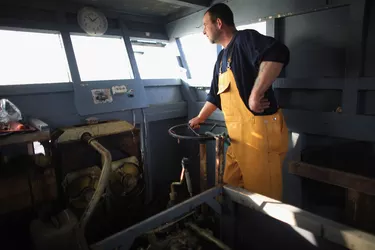
Ship crews catch over 3 million tons of shrimp every year, according to the State of the World Fisheries and Aquaculture report. Shrimp is a common food in many parts of the world. In the state of Louisiana, offshore boats catch shrimp in the Gulf of Mexico. The job of a shrimp boat captain is to operate a fishing vessel, and he earns his income though the sale of his catch -- the more shrimp he catches, the more he earns.
Career Overview
Video of the Day
Shrimp boat captains are responsible for operating commercial fishing vessels. The captain of a fishing boat is in charge of other crew members, including deck hands and fishing professionals. In addition to supervising other individuals, the captain also inspects the boat for safety and seaworthiness, and ensures that equipment is in proper working order. Formal education is typically not required for boat captains, and most individuals learn the trade through hands-on experience. Many shrimp boat captains begin as deckhands, and then move to positions with more responsibility.
Video of the Day
Typical Salary
According to the U.S. Bureau of Labor Statistics, or BLS, the median salary for all boat captains in the United States was $70,500, as of 2008. The lowest 10 percent of earners made $30,690 or more, while the top 10 percent earned over $117,310. The BLS also reports that the average salary for a boat captain working in the state of Louisiana was $77,020 per year as of 2010. The exact salary of a shrimp boat captain is usually not a guarantee, and depends on the success of the fishing operation.
Salary Variations
The income of a shrimp boat captain can change due to many different factors, and is not steady. Income is usually the highest in the summer and autumn months, due to the increased availability of shrimp. In the winter, seafood is less available and income often drops. The weather also affects fishing operations, and a period of bad weather can dramatically decrease shrimp boat earnings. Many boat captains own their vessels, and must pay for maintenance and fuel out of pocket. Changes in fuel prices and ship-repair costs can impact the amount of money that a captain retains.
Job Outlook
The Bureau of Labor Statistics projects that employment and earnings for fishing vessel operators will decrease steadily over the foreseeable future. Specifically, employment is expected to decline by 8 percent between 2008 and 2018. According to the BLS, this is primarily due to an increase in fishing regulations, which limit commercial fishing opportunities. Additionally, commercial fishing is becoming more automated with less demand for skilled boat captains compared to the past. Large, established commercial fishing companies are expected to have the best jobs and salaries for qualified captains.